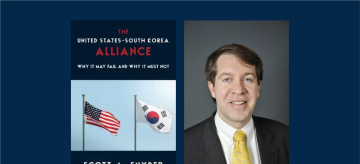Search 110 results
- Remove filter: Conflict & Warfare
- Remove filter: Technology
Filter by
Events
Series







The U.S.-South Korea alliance has been the cornerstone of bilateral cooperation and the U.S. security presence in the Indo-Pacific region for over seven decades and continues to serve as a model of partnership amid a growing range of challenges. Nevertheless, the rise of exclusive nationalism guided by “America First” or “Korea first” leadership that places national self-interest above alliance-based cooperation on shared challenges represents a point of vulnerability for the relationship. Combined with deepening political polarization in both countries, the cohesion and resilience of the U.S.-South Korea alliance may come under threat.
The United States–South Korea Alliance: Why It May Fail and Why It Must Not analyzes the internal and external threats to the alliance. It explores how a weakened U.S.-South Korea alliance could impact the security strategies of both countries and the broader security landscape in Northeast Asia. Additionally, it hypothesizes a future without the U.S.-South Korea alliance, shedding light on its potential impact and implications for U.S. and South Korean security strategies. Based on the analysis, the author concludes by offering valuable recommendations to the United States and South Korea for preserving and sustaining the alliance.
This book is suitable for the following disciplines in undergraduate and graduate courses:
- International Relations
- East Asian Studies and History
- Contemporary East Asian Foreign Relations
- Asian Security
- Students will analyze recent trends in global conflicts, especially in the post-WWII years.
- Students will consider major historical and modern day examples of conflict and identify patterns and underlying themes.
- Students will consider the impact and challenges of social media and cryptocurrency.
- Students will analyze the concepts of cyber sovereignty, online privacy, data storage, and use of cyberweapons.
- Students will discuss and debate whether the internet should respect national borders or the concept of a “free and open” internet (I.E: Should countries be allowed to regulate?).